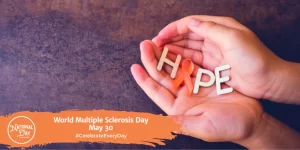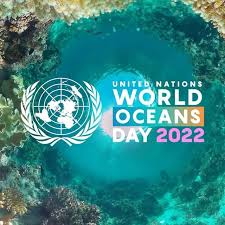 World Multiple Sclerosis Day on May 30th creates an opportunity to boost awareness and connect those with MS to resources and improve support systems.
World Multiple Sclerosis Day on May 30th creates an opportunity to boost awareness and connect those with MS to resources and improve support systems.
#WorldMultipleSclerosisDay
As one of the most common diseases of the central nervous system, Multiple Sclerosis impacts more than 2.3 million people around the world according to the Multiple Sclerosis International Federation. The term multiple sclerosis means “many scars,” and this term relates to the areas that appear on the brain and spinal cord after the myelin covering our nerves is damaged or dies. The damaged myelin leaves a lesion behind. These lesions are identified by an MRI when symptoms begin to appear.
The resulting symptoms vary and progress at different rates for each person diagnosed with MS. The disease is unpredictable, progressive, and challenging to diagnose. The cause is also unknown.
While there is no cure, treatments are advancing to help slow the progression of MS and reduce the symptoms. As with many conditions, education, research, and funding are necessary.
 Every year on June 8, World Ocean Day is commemorated to remind people of the importance of the oceans and the major role they play in everyday life. According to the United Nations, the day intends to raise awareness about the impact of human activities on the oceans and to create a united movement for the species of the ocean. Besides, the day is also observed to make raise public awareness of the ocean and its resources in order to promote global ocean and resource sustainability. The day intends to highlight the various resources that mankind derives from the ocean, as well as the various threats that the ocean faces.
Every year on June 8, World Ocean Day is commemorated to remind people of the importance of the oceans and the major role they play in everyday life. According to the United Nations, the day intends to raise awareness about the impact of human activities on the oceans and to create a united movement for the species of the ocean. Besides, the day is also observed to make raise public awareness of the ocean and its resources in order to promote global ocean and resource sustainability. The day intends to highlight the various resources that mankind derives from the ocean, as well as the various threats that the ocean faces.  Le Dicastère pour le développement humain intégral organise, du jeudi 29 novembre au samedi 1er décembre au Vatican, un important colloque international sur les drogues et les dépendances.
Le Dicastère pour le développement humain intégral organise, du jeudi 29 novembre au samedi 1er décembre au Vatican, un important colloque international sur les drogues et les dépendances.